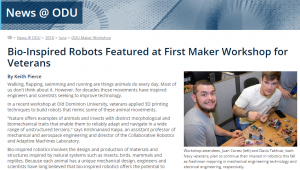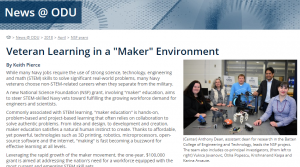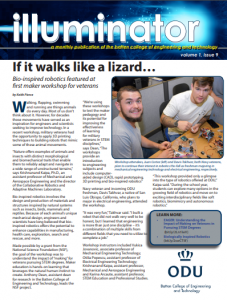Articles:
Online Articles:
- Pierce, K. (2018) If it walks like a lizard, Illuminator, Batten College of Engineering and Technology, Old Dominion University (click here)
- Pierce, K. (2018) Bio-Inspired Robots Featured at First Maker Workshop for Veterans, News @ ODU, June, 2018
- Pierce, K. (2018) Veteran Learning in a “Maker” Environment, News @ ODU, April 2018 (click here)
Bio-Inspired Robots Featured at First Maker Workshop for Veterans

Workshop attendees, Juan Cortez (left) and Davis Takhvar, both Navy veterans, plan to continue their interest in robotics this fall as freshman majoring in mechanical engineering technology and electrical engineering, respectively.
Walking, flapping, swimming and running are things animals do every day. Most of us don’t think about it. However, for decades those movements have inspired engineers and scientists seeking to improve technology.
In a recent workshop at Old Dominion University, veterans applied 3D printing techniques to build robots that mimic some of these animal movements.
“Nature offers examples of animals and insects with distinct morphological and biomechanical traits that enable them to reliably adapt and navigate in a wide range of unstructured terrains,” says Krishnanand Kaipa, an assistant professor of mechanical and aerospace engineering and director of the Collaborative Robotics and Adaptive Machines Laboratory.
Bio-inspired robotics involves the design and production of materials and structures inspired by natural systems such as insects, birds, mammals and reptiles. Because each animal has a unique mechanical design, engineers and scientists have long believed that bio-inspired robotics offers the potential to enhance capabilities in manufacturing, health care, search and rescue, and more.
Made possible by a grant from the National Science Foundation (NSF), the workshop aimed to understand the impact of “making” for veterans pursuing STEM degrees. Maker education is hands-on learning that leverages the natural human instinct to create. Anthony Dean, assistant dean for research in the Batten College of Engineering and Technology, leads the NSF project.
“We’re using these workshops to test the maker pedagogy and its potential for improving the effectiveness of learning for military veterans in STEM disciplines,” Dean says. “The workshops provide an introduction to engineering subjects and include computer-aided design (CAD), rapid prototyping, 3D printing and bio-inspired robotics.”
Navy veteran and incoming ODU freshman Davis Takhvar, a native of San Luis Obispo, California, and a prospective electrical engineering major, attended the workshop.
“It was very fun,” Takhvar said. “I built a robot that did not walk very well, to be honest, but I learned that engineering is more than just one discipline. It’s a combination of multiple skills from different fields that you need to utilize to complete a job.”
Workshop instructors included Kaipa; Vukica Jovanovic, associate professor of mechanical engineering technology; Otilia Popescu, assistant professor of electrical engineering technology, and Karina Arcaute, assistant professor, STEM education and professional studies.
“This workshop provided only a glimpse into the type of robotics offered at ODU,” Kaipa said. “During the school year, students can explore many options in the growing field of robotics and move on to exciting interdisciplinary fields like soft robotics, bio-mimicry and autonomous robotics.”
Veteran Learning in a “Maker” Environment

Center) Anthony Dean, assistant dean for research in the Batten College of Engineering and Technology, leads the NSF project. The team also includes co-principal investigators, (from left to right) Vukica Jovanovic, Otilia Popescu, Krishnanand Kaipa and Karina Arcaute.
By Keith Pierce
While many Navy jobs require the use of strong science, technology, engineering and math (STEM) skills to solve significant real-world problems, many Navy veterans choose non-STEM-related careers when they separate from the military.
A new National Science Foundation (NSF) grant, involving “maker” education, aims to steer STEM-skilled Navy vets toward fulfilling the growing workforce demand for engineers and scientists.
Commonly associated with STEM learning, “maker education” is hands-on, problem-based and project-based learning that often relies on collaboration to solve authentic problems. From idea and design, to development and creation, maker education satisfies a natural human instinct to create. Thanks to affordable, yet powerful, technologies such as 3D printing, robotics, microprocessors, open-source software and the internet, “making” is fast becoming a buzzword for effective learning at all levels.
Leveraging the rapid growth of the maker movement, the one-year, $100,000 grant is aimed at addressing the nation’s need for a workforce equipped with the most current and emerging STEM skill sets.
The Old Dominion University project, entitled “EAGER: Understanding the Impact of Making on Veterans in Pursuing STEM Degrees,” includes the development and delivery of two maker workshops for military veterans, designed to foster knowledge and expand interest in STEM careers.
“We plan to use these workshops to test the maker pedagogy and its potential for improving the effectiveness of learning for military veterans as it relates to STEM disciplines,” said Anthony Dean, assistant dean for research in the Batten College of Engineering and Technology. “The workshops will provide training and awareness in engineering subjects and will include computer-aided design (CAD), rapid prototyping, 3D printing and bio-inspired robotics”
Using data collected through surveys, as well as observations of teaching and related activities, the evaluations will focus on the before and after attitudes, behaviors and skills of workshop participants.
Results and resources will be disseminated through conferences held by a wide range of veterans’ organizations and the American Society of Engineering Education, as well as through relevant educational and professional journals. It will support the development of an educational model that can be replicated in veteran or adult student learning institutions across the country.
Illuminatior






